
5 HR Tools for Small Businesses on a Budget
Small business owners know that managing HR can feel like a full-time job on its own. Whether it’s hiring, payroll processing, or tracking employee hours, there’s a lot to handle—and if you don’t have a big team to lean on, it can get overwhelming fast. That’s where affordable HR tools for small business come in.
These HR systems are built to make life easier for small businesses, as they help you stay organized, keep employees happy, and avoid costly mistakes, all without stretching your budget. In this article, we’re taking a look into some of the best HR software solutions out there, ones that cover everything like automating payroll and simplifying employee onboarding. So, if you’re looking for ways to handle your human resources duties and keep your team engaged, you’re in the right place.
Why Small Businesses Need HR Tools
Running a small business means you’re likely wearing numerous hats—and HR is one of the trickiest. When you’re managing HR operations like recruiting, onboarding, expense management, benefits administration, and compliance, it’s easy to feel like there aren’t enough hours in the day. In a small team, there’s often no one dedicated solely to HR services, so these tasks can fall to whoever (presumably) has time on their hands. This can mean late payroll, missed applications, or inconsistent onboarding, which leaves new hires feeling out of the loop before they’ve even settled in.
Another big challenge for small businesses? Compliance. Keeping up with labor laws, tax changes, and other regulations is tough when you don’t have a legal or HR expert in-house. Mistakes can lead to fines or legal headaches—something no small business owner wants to deal with. All of these challenges highlight why having a reliable HR software solution can be such a game-changer for small teams.
HR software for small businesses allows them to save time and resources. It also helps keep mistakes at a minimum. For instance, payroll automation mitigates human error, while attendance tracking guarantees compliance with work-hour regulations. On top of that, offering employees easy access to their schedules, employee benefits, and leave requests promotes transparency and satisfaction. And considering it can aid in improving retention, this could offer relief to the bottom line. Studies show it can cost a company up to twice an employee's annual salary to find and train a candidate to replace them.
6 Small Business Employee Benefits You Should Consider →
Top 5 Budget-Friendly HR Tools for Small Businesses
Now that you know what a life-changer can be an HR solution for your small business, let’s evaluate your top options for HR software providers:
1. TalentHR: Affordable and Comprehensive HR Management
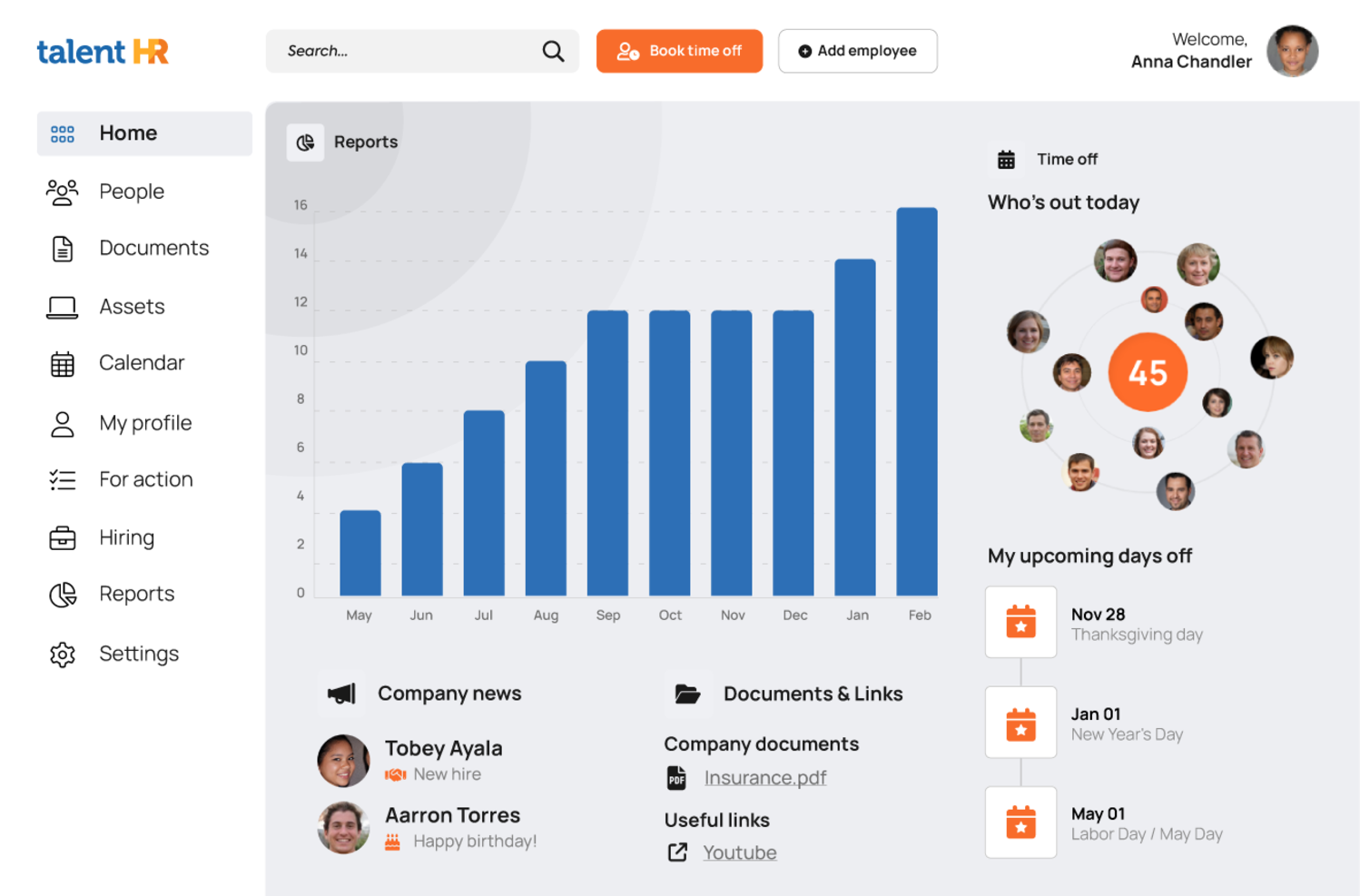
TalentHR is a comprehensive, all-in-one platform designed to address the core HR challenges that small businesses and startups often face. Its free version, available for teams of up to 10, offers a wide range of essential features, which makes it an excellent choice for organizations seeking a flexible and scalable HR solution.
Its free plan includes fundamental HR tools like a human resource management system, time off tracking, document management, applicant tracking, employee onboarding, performance management, and reporting, which covers core HR needs at no additional cost—perfect for small businesses on a budget.
Beyond the typical HR features, TalentHR offers:
- Mobile access: With its mobile app, TalentHR lets you manage employee information and HR tasks from anywhere, whether you’re at the office or working remotely.
- Customizable careers page: Companies can create a branded Careers page to attract high-quality candidates.
- AI-enhanced applicant tracking: TalentHR’s AI helps generate compelling, accurate job descriptions that stand out to potential applicants and automatically score candidates against core skills for each position.
- Seamless integrations: TalentHR integrates with popular tools like Slack, Zapier, Google Calendar, or TalentLMS, and also comes with a well-documented API.
- Unlimited support for every plan: Every TalentHR plan includes free, unlimited email support, with responses guaranteed within one business day.
- Quick setup and scalability: As a SaaS platform, TalentHR takes seconds to get started with. It requires no deployment, which allows companies to get up and running in seconds and scale as their business grows.
Customize TalentHR to match your company →
2. Zoho People: Best for Time-Off Tracking and Simplicity
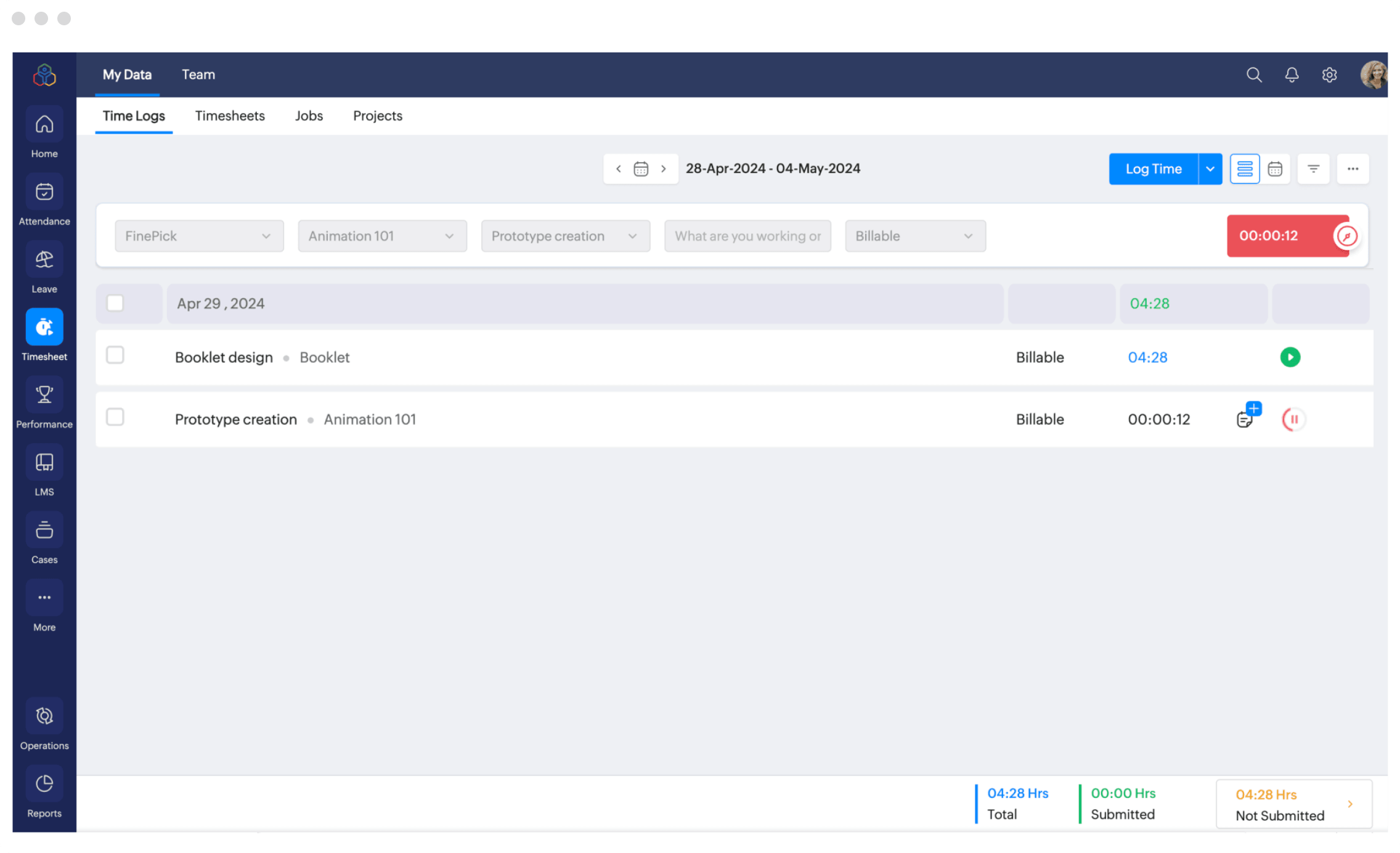
Zoho People is a cloud-based HR tool that helps small businesses simplify core HR functions like employee scheduling, time-off tracking, employee records, and attendance. Employees can request time off online, and managers can approve these requests with a quick click, which makes it an easy choice for busy teams.
It’s known for its user-friendly interface and affordability, and its scalable plans make it suitable for small businesses that plan to grow. On the other hand, Zoho People’s features might run a bit short of the mark for companies with complex software needs. In the end, Zoho has so many tools that its strengths could be spread too thin.
3. Gusto: Best for Payroll Management
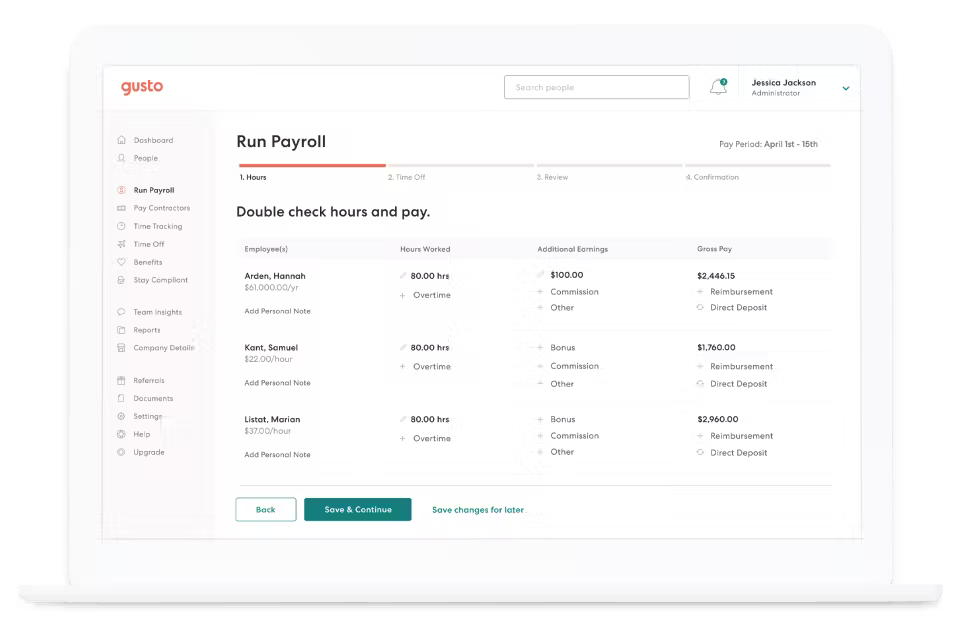
Gusto is a payroll and benefits management platform built to simplify compensation management, especially for companies with multi-country or local workforces. Designed as an HRIS, Gusto automates payroll calculations and tax filings, freeing up much of the hands-on effort that comes with payroll administration.
While Gusto’s features are powerful, it doesn’t offer a free trial, and the entry cost may be higher than other budget-friendly options. Additionally, setup may require significant manual data entry at the start.
4. Deel: Best for Managing Global Teams
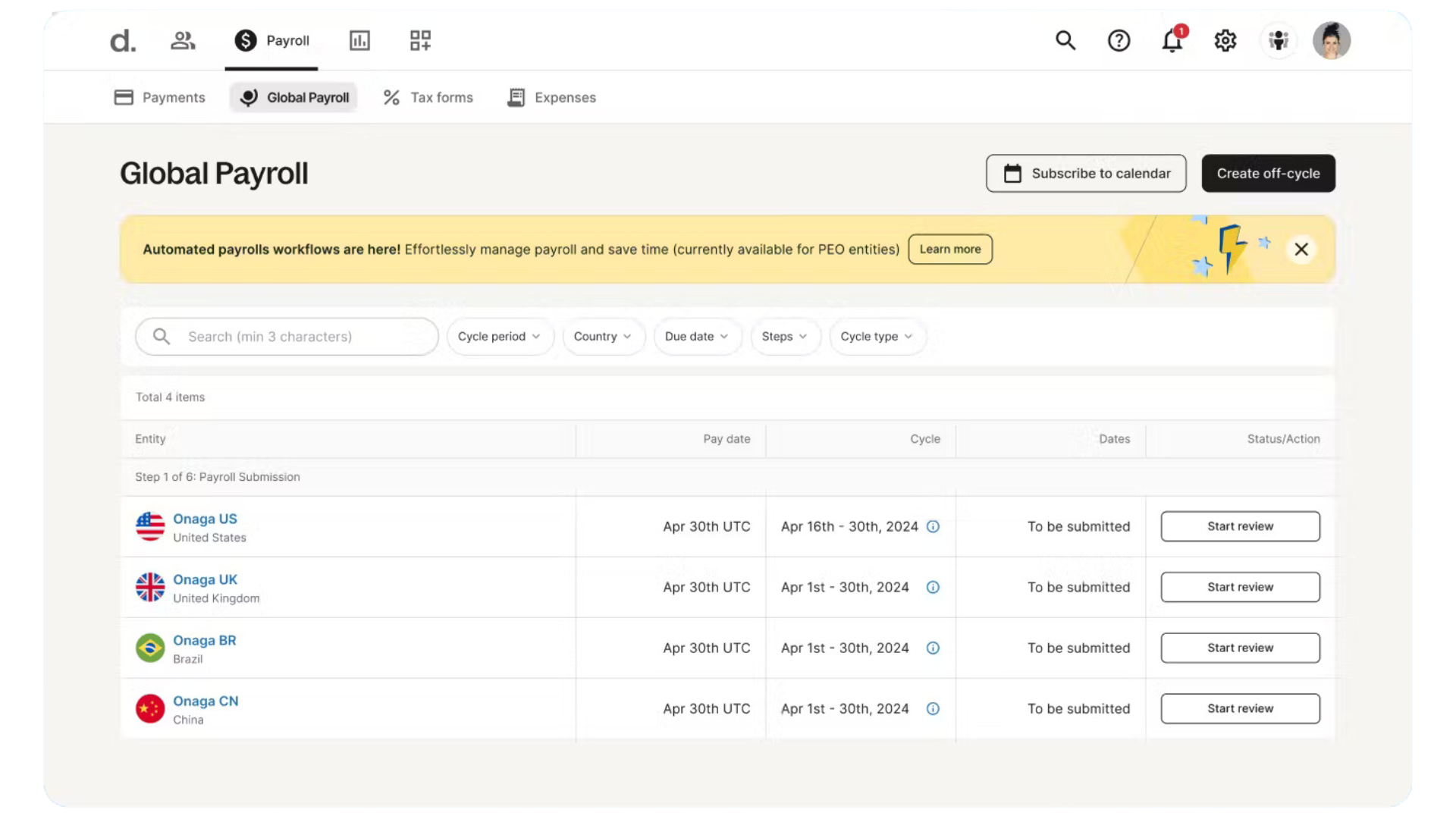
Deel is a good choice for small businesses that are managing international and remote teams. Its focus on global payroll and compliance is especially useful if you’re hiring freelancers or full-time employees across different countries. Deel handles payroll and keeps you in compliance with local labor laws, so you don’t have to deal with the hassles of international hiring alone.
Its free plan provides essential features for small businesses working with remote talent, like onboarding and payments. It's mostly used to pay contractors out, and companies that need to have full-fledged HR analytics or a lightweight recruiting platform should consider something else.
5. Frappe HR: Open-source Solution
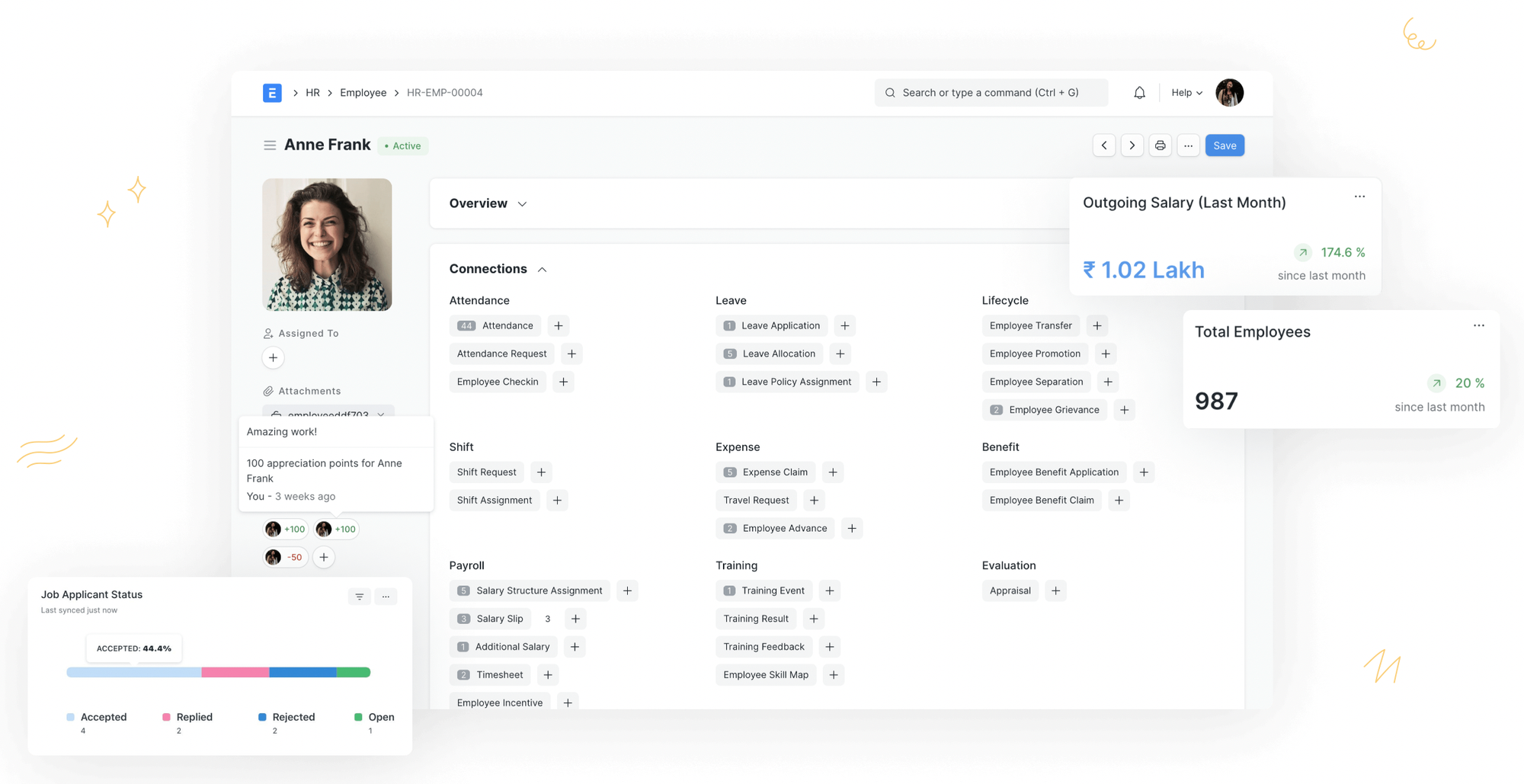
Frappe HR is an open-source platform that offers a customizable HR solution for small businesses. While it isn’t marketed as entirely free, its free tier provides key functionalities for companies looking to handle HR without added costs.
Its core features include employee management software, leave tracking, and attendance—making it a practical solution for companies with technical knowledge who want full control over their HR processes.
Choosing HR Tools for Small Businesses
Choosing the right HR tool can make or break how effectively you manage HR tasks in a small business setting. That’s why we’ll provide you with some essential features to consider:
Ease of Use
Small business teams don’t always have the time or resources for extensive training, so the HR tool you choose should be user-friendly and easy to get used to. Look for tools with an intuitive interface, simple setup, and resources (like tutorials or customer support) that help you get the most out of the software quickly.
Scalability
A good HR tool should grow with your business. Many HR software solutions offer affordable entry plans with options to add users and features as needed. Scalable HR tools save you from having to switch systems later as your business expands and HR gets more complex.
Integration Capabilities
HR tools that integrate with other platforms you’re already using—like accounting or payroll software, time tracking tools, or communication apps (such as Slack or Google Workspace)—are highly valuable for running user-friendly workflows.
Cost-Effectiveness
Cost is a major factor for small businesses with limited budgets. Look for tools with free versions, affordable entry-level plans, or options with tiered pricing based on features. This way, you can cover your fundamental HR goals without stretching your budget too thin.
Use Affordable HR Software for Small Businesses
In small businesses, HR tasks are often managed by the owner or shared among a few team members with other primary roles. For this reason, a tool that simplifies HR functions through automation is imperative so even a lean team can handle HR efficiently without dedicating extensive time to it.
On top of that, smaller businesses typically deal with a limited budget. They need solutions that don’t break the bank. Many HR platforms, like TalentHR, understand this and offer free versions or budget-friendly plans with essential features. Thus, when selecting a tool, focus on one that meets your core HR requirements at an affordable price point.
Start your free 14-day Premium trial of TalentHR—no credit card required—and experience how small business HR software can transform your workflow. After the trial, you can continue with the forever-free starter plan. It takes seconds to get started—try it yourself!


